 |
LEADS 2025 Goal 2 Team 2020-2021
By Luis Cifuentes, Vice President for Research and Dean of Graduate School
LEADS 2025 Goal 2 is to Elevate Research and Creativity. Dr. Kathy Hansen, director of Arrowhead Center, and I are co-champions for Goal 2. We lead a team that is charged to:
- Identify actions and prioritize them by impact or resource needs
- Facilitate accomplishment of those actions
- Identify champions for objectives and actions
- Identify opportunities for collaboration, especially where such collaboration will increase synergy within the goals
- Reach out to units around campus to understand how those units are making progress toward goals and encourage those efforts
- Communicate
- to colleges, departments, councils, and other representative bodies
- at periodic meetings of Goal Teams and to share implementation progress, successes and failures.
- to campus community: both small progressive steps and larger accomplishments.
We welcome new members to Goal 2 for the 2020-2021 academic year:
- Dr. Matt Byrne, Department Chair of Art, Dona Ana Community College
- Dr. Phame Camarena, Dean of the Honors College
- Ms. Adriana Chavez, Senior Communications Specialist
- Dr. Hilda Contreras, Post-doctoral fellow in Educational Leadership and Administration
- Dr. Phillip DeLeon, Associate Vice President for Research
- Dr. Leslie Edgar, Associate Dean and Direct of Research, College of Agricultural, Consumer, and Environmental Sciences
- Ambassador Delano Lewis, Consultant to the Provost
- Dr. Jay Lillywhite, Academic Department Head, Agricultural Economics and Business
- Mr. Jonathan Ortiz, President of the Graduate Student Council
- Dr. Kelly Sharp-Hoskins, Associate Professor of English
- Dr. Tanner Schaub, Research Professor, Animal and Range Sciences
- Dr. Marcella Shelby, Strategic Initiatives Officer, Physical Science Laboratory
I am pleased to announce that we have identified champions for Goal 2 actions as shown in the table below (*may be replaced next year). Please contact the appropriate champion if you have opinions on prioritizing actions by impact or resource, and wish to share ideas for improving action progress or increasing synergy with other LEADS 2025 goals. Moving forward, action champions will communicate small progressive steps and larger accomplishments through the Research and Graduate School digest.
|
Facilitate the convergence of research and creative activity to address local and global challenges, integrated with undergraduate and graduate student education
|
|
2.1.1 Align research strengths across all academic units to create integrated research centers supported with strategic investment and interdisciplinary hires
|
Luis Cifuentes
|
|
2.1.2 Facilitate formation and continuation of interdisciplinary collaborations, inclusive of data and information science as well as creative or non-STEM disciplines
|
Hilda Contreras
|
|
2.1.2 Develop interdisciplinary academic degrees aligned with research capabilities in emerging areas
|
Lakshmi Reddi
|
|
2.1.4 Create competitive faculty startup packages that are based on data indicating what supports faculty success
|
Phillip DeLeon
|
|
2.1.5 Identify and build strategic public–private partnerships that allow for intellectual property exchange while providing opportunities for student research
|
Kathy Hansen*
|
|
2.1.6 Enrich and expand corporate, industrial, and government relationships to advance research, scholarship and creative activity
|
Luis Cifuentes*
|
|
Intentionally grow humanities, social sciences and creative arts to achieve comprehensive excellence in research and creative activity
|
|
2.2.1 Increase the number of humanities, social sciences and arts doctoral degree programs and graduate enrollment within these programs
|
Kellie Sharp-Hoskins
|
|
2.2.2 Plan, develop and support a creative campus
|
Matt Byrne
|
|
2.2.3 Encourage and support faculty and students to engage in funded creative activities
|
Phillip DeLeon*
|
|
2.2.4 Recognize and/or reward faculty, graduate and undergraduate students who engage in scholarship and creative activity
|
Phame Camarena
|
|
2.2.5 Leverage existing and create new public–private partnerships that elevate the humanities, social sciences and arts
|
James Murphy
|
|
Amplify impact of research findings by addressing local needs that align with global challenges
|
|
2.3.1 Develop sustainable research programs in energy, food and agriculture, and water to serve as drivers for economic development throughout New Mexico
|
Jay Lillywhite
|
|
2.3.2 Leverage NMSU’s land- and space-grant missions to initiate a space sustainability academic and research program by integrating NMSU’s commercial space and sustainability efforts
|
Laura Boucheron
|
|
2.3.3 Promote research, scholarship and creative activity in cross US-Mexico border studies
|
Hilda Contreras
|
|
2.3.4 Expand research impact by leveraging research infrastructure, faculty, and staff of entities such as Physical Science Laboratory, Experiment Stations, observatories, museums and herbariums.
|
Tanner Schaub
|
|
2.3.5 Organize and support interdisciplinary teams to increase competitiveness for large research grants, for example institutional and infrastructure
|
Phillip DeLeon
|
|
2.3.6 Promote and reward entrepreneurial initiatives
|
Kathy Hansen
|
|
Amplify impact of research on society and the economy and promote international collaboration by accelerating technology and knowledge transfer
|
|
2.4.1 Reward faculty and staff engagement in creation of IP and technology transfer through financial incentives such as intellectual property revenue sharing, new equipment, facility enhancements, and legal support
|
Kathy Hansen
|
|
2.4.2 Develop a communications plan to amplify research, scholarship and creative activity outcomes beyond NMSU
|
Adriana Chavez
|
|
2.4.3 Grow research, scholarship and creative activity through international collaborations
|
Delano Lewis
|
|
2.4.4 Build long-term strategic partnerships and relationships that support public impact research and programming
|
Marcela Shelby
|
|
2.4.5 Promote Cooperative Extension Service, engineering extension and outreach, STEM Outreach Center, and other outreach programs and monitor for opportunities for technology transfer
|
Leslie Edgar
|
|
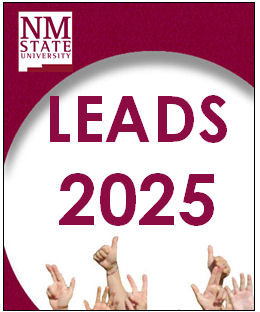
|
Biological Safety and IBC Updates
By JoAnne Dupre, Biosafety and Export Control Manager, RIC
The Centers for Disease Control and Prevention (CDC) has released the sixth edition of Biosafety in Microbiological and Biomedical Laboratories (BMBL). This updated guidance document contains the recommended best practices for safe conduct of work with infectious microorganisms in research and clinical laboratories. Refer to the BMBL for containment criteria, laboratory Biosafety Levels, equipment including descriptions of biological safety cabinets, disinfection principles, transportation packaging, housing for animals and arthropods, requirements for work with bloodborne pathogens, and more. The BMBL 6th edition can be accessed online at https://www.cdc.gov/labs/BMBL.html.
Biosafety Awareness training is available online through CITI courses at https://www.citiprogram.org. Choose the course, “Initial Biosafety Training”. After completing CITI courses, please send an email to the Biosafety Manager at jdupre@nmsu.edu to have your trainings records transferred to your profile in Training Central. The safety training requirements for “OSHA Bloodborne Pathogens” and “Animal Biosafety” can also be completed through CITI courses this way.
Institutional Biosafety Committee (IBC) Registration Updates: all IBC-approved lab registrations were updated for activities and personnel through the Return to Research and Creativity (RTRC) safety plans this year. If Principal Investigators anticipate minor changes in the use of biological materials, location, or personnel in December or January, please continue to use the RTRC safety plan process to report these changes. If significant changes are planned in the scope of work, use of infectious agents, cell lines, or recombinant nucleic acid molecules, please use the forms for the IBC application and activity modification, available on the Research webpage at https://research.nmsu.edu/compliance_and_ethics/subpages/IBC/Forms.html.
|
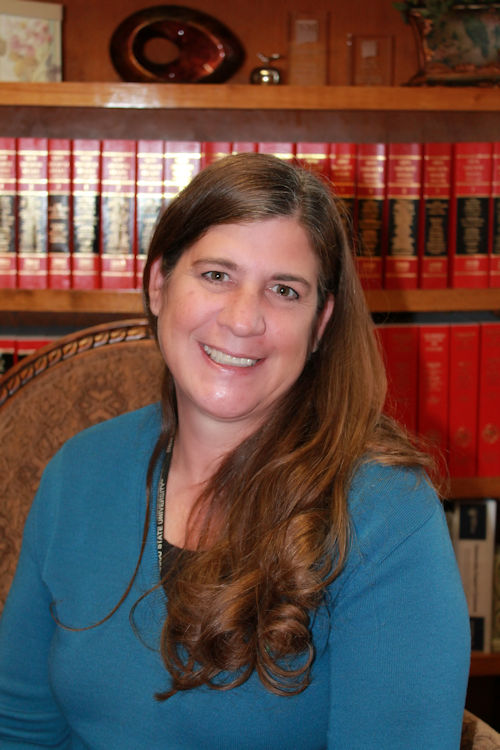
Dr. Joanne Dupre, Biosafety
and Export Control, RIC
|
Arrowhead Center and LEADS 2025
By Kathryn Hansen, Director, Arrowhead Center
Arrowhead Center is pleased to be contributing to NMSU’s goal to Elevate Research & Creativity (NMSU LEADS 2025, Goal 2), amplifying the impact of research on society through technology transfer and entrepreneurship. Specifically, Arrowhead Center is focused on two actions supporting Goal 2: 1) rewarding faculty and staff engagement in the creation of intellectual property and technology transfer, and 2) promoting and rewarding entrepreneurial initiatives. Potential rewards under consideration for engagement in technology transfer include incentive funds, internal awards for intellectual property creation, increased intellectual property revenue sharing, new equipment, and facility enhancements.
We are in the process of selecting the best metrics to baseline and track progress on our actions, such as number of technology agreements, number of faculty members serving as consultants to companies licensing NMSU technology, licensing fees and revenues, number of entrepreneurship courses offered to students, number of student entrepreneurs, and number of faculty and students involved in NMSU startups addressing local/global challenges. In support of Goal 2 and the engagement of NMSU researchers and creators, Arrowhead is releasing a series of informational videos to enhance technology transfer and commercialization knowledge. Aligned with increasing internal awareness of technology transfer, Arrowhead is enhancing external awareness of NMSU technologies available to license through videos, marketing flyers, and website information on licensing opportunities.
|
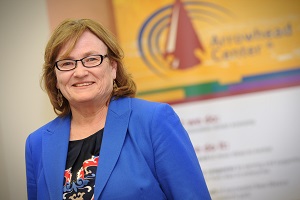
Kathryn Hansen, Director
and Chief Executive
Officer, Arrowhead Center
|
NSF-Funded Building HSI Learning Resilience in the Face of Crisis: A Success
By Hamid Mansouri Rad, Senior Proposal Development Specialist, RAS
The Building HSI Learning Resilience in the Face of Crisis virtual conference held on November 2-4, 2020 gathered 200 attendees and experts from various academic institutions. Funded by NSF and led by Dr. Antonio Garcia, College of Engineering’s Associate Dean of Academics, this conference aimed at understanding the effects of the pandemic and its continuing impact on H.S.I. student learning by examining current practices in order to create resiliency with an emphasis on exploring new digital tools to enhance distance learning. The conference’s primary topics were
- Mitigating the Digital Divide
- Lab, Design Projects, and Internships from a Distance
- Enhancing Mentoring using Distance Learning Tools
- Digital Learning: What are HSI Faculty, Students, and Families of Students Saying?
- Use of Data Science to Inform Nextgen Learning Software, and
- Quo vadis? a forum to understand how the H.S.I. community will plan to adapt digital tools discussed post conference.
The event also offered opportunities for discussions on subtopics such as: Reimaging Online Education for Better Futures; Expanding Access, Openness, and Flexibility; Open Pathways and New Credentials for Lifelong Learning; New Business and Delivery Models for Changing Times; and New Skills for Living and Working in New Times
The conference commenced by opening plenary remarks by Dr. Sarah Rodriguez, Associate Professor of Higher Education and Learning Technologies at Texas A&M-Commerce, and ended with closing plenary presentation by Dr. Erika Camacho, NSF’s HSI program officer in the Division of Human Resource Development. The conference featured sessions in various formats including 12 paper presentations, 12 panel sessions that included faculty, student and student families’ perspectives, 10 poster sessions, and a workshop led by Dr. Marshall Taylor, Assistant Professor of Sociology and one of the co-principal investigators on this NSF funded effort. Five breakout discussion sessions focusing on major conference themes were held on November 4th, the final day of the conference. Conference attendees reported positive experiences and impressions of the conference. Several expressed their opinion that the conference was excellent, meaningful, and provided quality learning experiences in the form of presentation content but also the overall experience of attending a conference held entirely online. Attendees and presenters also expressed their satisfaction with the conference overall, and enthusiasm for student presenters.
"The HSI Learning Resilience Conference provided a forum where we learned from each other - especially from students," states Dr. Garcia. "It was also a great experience to work with the ePosterBoards virtual conference environment and how it allowed us to experiment with workshop, plenary, panel, poster, and roundtable formats."
Those who served in the Conference Program Committee were
- Dr. Julia Parra, a co-principal investigator on this project (School of TPAL, Learning Design & Technology, NMSU)
- Dr. Ramon Garcia Barrios (Director, Department of Education, Universidad de Puerto Rico-Humacao, Puerto Rico)
- Rafael Magallan (Former Director of Government Relations, The College Board, Sacramento, CA)
- Dr. Eva Fernandez (Assistant Provost, Queens College, The City University of New York)
And Nora Burris (Office of Academics, NMSU College of Engineering) and NMSU doctoral candidates Ayman Alzaid and Lorin Flores served as the members of the Conference Operations Committee.
For more information about the proceedings of this conference, contact Dr. Antonio Garcia at garcia81@nmsu.edu.
|
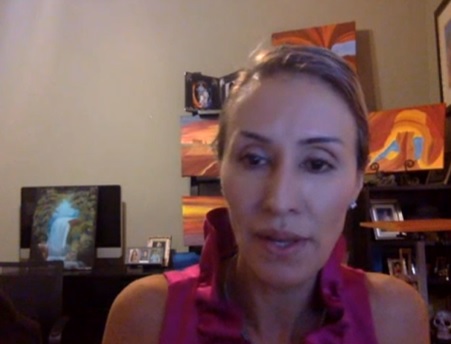
Dr. Erika Camacho, National
Science Foundation
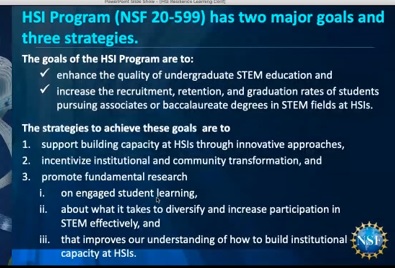
|
2021 Mountain West CTR-IN Pilot Grants Funding Announcement
By Hamid Mansouri Rad, Senior Proposal Development Specialist, RAS
The Mountain West Clinical Translational Research Infrastructure Network (CTR-IN) has released its 2021 Single PI and Multi-Site Pilot Grants funding opportunity announcements (FOA). These grants provide $60,000 seed funding to support clinical or translational research that will inform NIH “R” level proposals or applications to other external funding sources. This year’s programmatic priorities are:
- Childhood obesity and metabolic conditions including diabetes and other related factors of food security, food sovereignty, and healthy food access.
- Opioid and other substance abuse, mental health / suicide prevention and psycho-social trauma.
- COVID-19, including impacts to healthcare access, associated influences on mental health, and disproportionate impacts to vulnerable populations.
Qualified applicants are faculty members who are eligible to submit extramural proposals and must be nominated by the Office of the Vice President for Research and Dean of Graduate School. We are limited to nominate four Single PI applicants and one applicant for Multi-Site grants. To apply for this opportunity, please send email to ls-ras@nmsu.edu by 5:00 pm on January 4, 2020.
The MW CTR-IN Program is hosted at the University of Nevada, Las Vegas, representing a partnership among 13 major U.S. public universities across seven Mountain West IDeA States. In the last cycle, two NMSU faculty members, Drs. Chris Sroka (Economics, Applied Statistics & International Business) and Kathryn Olszowy (Anthropology) succeeded in securing pilot grants for their research projects.
For more information about nomination package and other requirements please see the FOAs (Single PI and Multi-Site), or send an email to hamid@nmsu.edu.
|
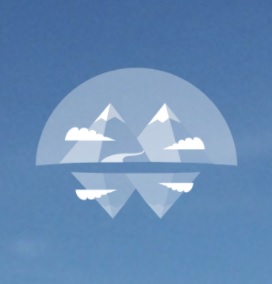

|
Research Administration Spotlight: John Villescas
By Hamid Mansouri Rad, Sr. Proposal Development Specialist, RAS
John Villescas is one of the RAS Contracts Administrators who predominately assists principal investigators in units that are not under NMSU colleges. These units include New Mexico Department of Agriculture, the Police Department, the Fire Department, KRWG, Office of Student Success, the Library, and more recently Grants and Doña Ana Community Colleges.
John joined NMSU’s Research Administration in 2006. Prior to that, he was a Manager for Occupational Medicine Clinic for Family Medical, and an Administrator for Rehabilitation and Occupational Medicine (ROM). He was also a flight attendant with Pan American Work Airways in New York until its collapse in 1991.
Unknown to many is that John is an athletics administrator. He is a Certified NCAA D-I Volleyball Official, one of two Head Volleyball Officials for New Mexico Athletics Association (NMAA – High School) and officiates Track and Field as well as Cross Country events. He is also on the NM SW Volleyball Sports Specific Board and is on his 4th appointment to the NMAA Executive Board.
John is known for his patience in guiding his clientele through the intricacies of grants and contracts. “I will do everything and anything to help my clients achieve their goals,” he states.
John holds a Bachelors of Business Administration from NMSU and once pursued an MBA at UNM’s Anderson School of Management, but had to postpone his graduation to take advantage of a job opportunity.
John Villescas can be reached at johnvill@nmsu.edu.
|
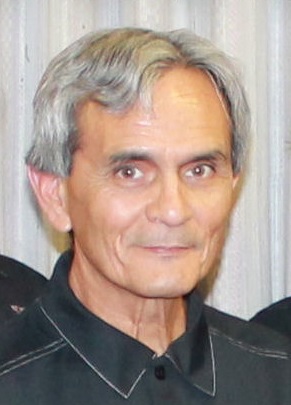
John Villescas, Research
Administration Services, NMSU
|
Arrowhead Center SBIR Accelerator Applications Due December 4th
By Dana Catron, Director of Strategic Operations, Arrowhead Center
Do you have a technology or innovation that can improve health or save lives, and has commercial potential? Are you interested in NIH SBIR program? Arrowhead Center’s SBIR Accelerator (ACSA) provides the structure and support you need to develop a strong proposal package.
The ACSA program, tailored for the NIH April 5th deadline, is a 12-week cohort-based program that offers real-time support for small businesses or faculty researchers preparing a SBIR/STTR proposal package. Drawing on the resources and expertise of NM FAST, ACSA will provide cohort participants a guided, structured track of support from registration to submission. During the course of the 12-week program, participants will receive guidance on areas such as selecting a relevant topic area, preparing an accurate budget, and creating a complete proposal package that adheres to all NIH requirements. To register, click here.
|
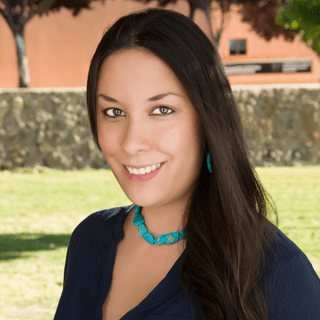
Dana Catron, Director of
Strategic Operations,
Arrowhead Center
|
Pivot Funding Opportunity Database
This is a reminder that in order to assist NMSU faculty and staff in locating external funding opportunities, the Office of the Vice President for Research and Dean of Graduate School has purchased a subscription to ProQuest’s Pivot software available at https://pivot.proquest.com/session/login.
To create an account with Pivot for the first time
- Click on the Sign up link.
- On the next page, click on Use email address/create password.
- Enter your name.
- Enter your NMSU email address.
- Create a password.
- Choose New Mexico State University from the Affiliated Member Institution drop down menu.
- Check the consent checkbox.
- Check the reCaptcha check box.
- Press the Create my account button.
To request a one-on-one or group Pivot training, send email to hamid@nmsu.edu.
|
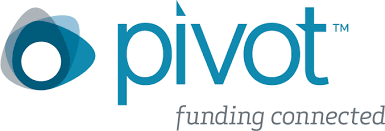
|
Graduate School
|
Holiday Stress and the Pandemic: Take Control of Your Holiday
By Luis A. Vazquez, Regents Professor and Associate Vice President for Research and Graduate Studies
This year, the holidays are becoming more and more challenging not just because the pandemic has exacerbated everything we are used to dealing with at a normal level, but has also made us reflect more on our lives. For some of us, we have started sleeping more than usual or very little as we stare at the ceiling. For few of us bathing has become more sporadic and diminishing each week. For many of us, we have noticed skin irritations on our face and body, along with a larger number of recurring headaches. There are a few of us who are having facial twitches that are sending out Morse codes to our friends and family. Yet, others have acquired some chest pains, pains in the lower back or in our legs. Emotionally, some of us have silently cried over being overwhelmed over our experiences. Anger seems to be displayed more often with others and loved ones. For many, feelings of helplessness have set in as part of our daily lives. For others, we have become more introspective and become very quiet observers as we criticize others in our minds with these emotions. Behaviorally, some of us are trying to take control. This may take the place of just taking over and minimizing others around us. Some of us have become very outwardly critical and short with others. For some of us, anything that anyone says to us becomes a shout for battle. Yet for others making things financially secure and caring for others has become the ultimate challenge. If you are experiencing any of the things I just mentioned then you are experiencing the pandemic holiday stress, not just the normal holiday stresses.
Read more
|

|
Need Guidance on Securing External Funding? Contact Me!
If you are an NMSU graduate student or post-doctoral scholar needing guidance on securing external funding, please contact me at fee@nmsu.edu. Please also visit the list of current funding opportunities that I maintain on the research website and let me know if you have any questions.
Chong-Hwey Fee
|

Chong-Hwey Fee,
Proposal Development
Special Specialist, RAS
|
|
Questions and comments regarding NMSU’s Research and Graduate School Digest should be directed to Hamid Mansouri Rad, Ph.D. at hamid@nmsu.edu, (575) 646-6429.
|












